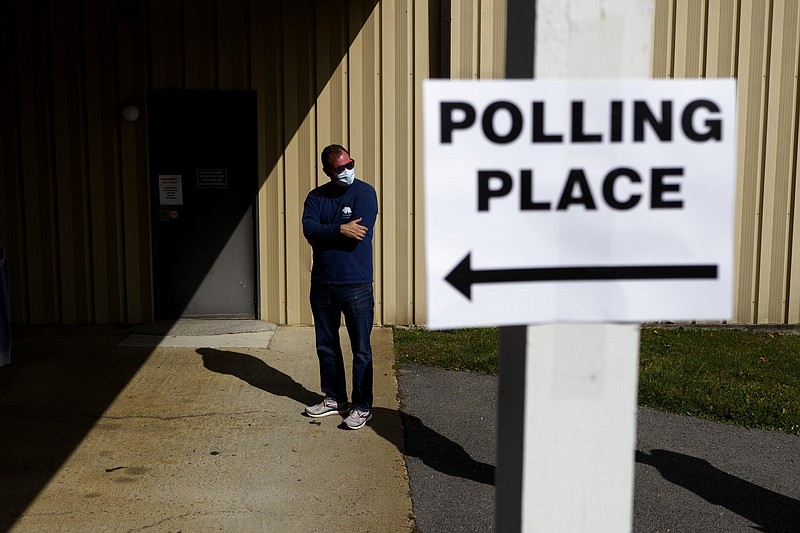We voted. And we voted. And we voted some more.
And now we're counting and counting, and we'll count some more.
That's OK - despite what President Donald Trump said on Election Day as he tried yet again to cast doubt on our votes.
"We should be entitled to know who won on November 3," he told reporters during a visit to his campaign headquarters on Election Day.
It was an undemocratic response, but not one that should surprise us - considering who said it.
What we are entitled to in this democracy is that everyone who cast a ballot under the rules determined by their state should and must have full faith that their vote will be counted.
Suffice it to say, the race, at press time for these pages, was still a cliff-hanger.
And it matters to people. A lot. So much so that more than 100 million Americans had voted early as of Monday night, according to the University of Florida's United States Elections Project.
In the entire 2016 election four years ago, about 138 million people voted, so turnout even on election eve was nearly 75% of all the ballots cast four years ago.
The voting-eligible population - people who should be able to vote if registered - is 239.2 million, so turnout on Monday night already was almost halfway there, putting the 2020 U.S. presidential election well on the way to scoring the highest voter turnout in more than a century.
It clearly reflects the high stakes in our country.
The failure to contain COVID-19 has decimated whole industries - costing thousands of jobs - especially in travel, leisure, dining and entertainment. There are now five million more people unemployed than when Trump took office in January 2017.
Eight million people have slipped into poverty since May, according to researchers at Columbia University, and millions of students are not taking classes in person.
There also are fears of unrest and violence. The New York Times wrote Tuesday that as Election Day dawned, plywood over windows from Washington to New York to Los Angeles sent an ominous sign.
The standard logic is that heavy turnout bodes well for Democrats, and the insecure Trump, as he did with that comment before the polls even closed, ceaselessly sought to undermine the votes of younger, independent, and female voters - whose support he knew, based on pre-election polling, he might not receive.
The high turnout also was an hoped-for antidote against the memory of 2016 when polls seemed sure for the Clinton/Kaine ticket, sending Democrats into complete freakout when - though Clinton won the popular vote by nearly 3 million votes - Trump managed to thread an improbable needle and win The Electoral College vote.
The other driver, of course, was COVID-19. Enough said.
In Tennessee, nearly 2.3 million people voted early - still staying as red as red can be and balloting for Trump while also putting Bill Hagerty in the Senate over Memphis Democrat Marquita Bradshaw, an environmentalist, activist and the first Black woman to be nominated by a major Tennessee party in a statewide race.
Tennesseans in the 3rd Congressional District also seemed near press time to be returning Republican Chuck Fleischmann to the U.S. House of Representatives, but his Democratic challenger, a smart but political novice, Meg Gorman, still was pulling about 33% of the votes.
We keep saying Fleischmann is vulnerable but Democrats have not yet found the right candidate with both charisma and political experience.
Closer to home, Glenn Scruggs was giving Republican state Sen. Todd Gardenhire a run, and in the state House, Rep. Robin Smith and Rep. Esther Helton will be going back to Nashville after defeating their Democratic opponents.
In Georgia, 3.9 million people had already voted by Monday evening - edging close to the 4.2 million who turned out there in 2016.
The competitiveness was clear in the Peach State even on Monday when former President Barack Obama gave a nearly 40-minute speech at a drive-in rally in Atlanta. Obama made a last-minute pitch to mobilize voters in this battleground state that could help deliver Democrats the White House and the Senate.
"I've got one word for you Atlanta: Tomorrow," said Obama, invoking the name of the late congressman John Lewis, D-Georgia. The former president told a crowd assembled outside the former Atlanta Braves stadium: "Tomorrow, after four years of failure, you have the power to change America. But you're going to have to vote."
Georgia was listening. The state in recent years has increasingly edged from a solid red state to a purple one, and - we'll see for sure when the counts are done - may become a blue state.
This election already has been different. Here's hoping in days to come it will be really different.
